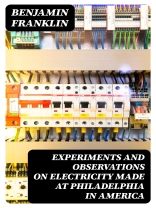Benjamin Franklin’s ‘Experiments and Observations on Electricity Made at Philadelphia in America’ stands as a landmark contribution to the early understanding of electrical phenomena in the 18th century. Written in an accessible yet scientifically rigorous style, Franklin’s work amalgamates methodical experimentation with narrative flair, appealing to both the learned and the lay reader. The text is distinguished for its firsthand accounts of groundbreaking experiments, including the famous kite experiment, which not only illuminated the nature of electricity but also laid foundational principles for its study, ushering in an era of scientific inquiry during the Enlightenment. Benjamin Franklin, a polymath known for his insatiable curiosity and innovative spirit, explored many fields, from politics to printing. His experiences as a statesman, inventor, and scientist provided him with a unique perspective that deeply influenced his approach to scientific discourse. Franklin’s engagement with contemporary scientific thought, coupled with his own inventive experiments, reflects a desire to bridge technical knowledge with everyday life, making the complexities of science accessible to a broader audience. I highly recommend ‘Experiments and Observations on Electricity’ to anyone intrigued by the origins of electrical science and its implications for modern technology. Franklin’s narrative not only educates but also inspires, embodying the spirit of inquiry that continues to drive scientific progress today.
लेखक के बारे में
Benjamin Franklin (1706-1790) was one of the most illustrious figures in American history, renowned for his contributions not just to literature, but also to science and public service. As a polymath, Franklin engaged in a myriad of activities, some of which included being a printer, a political theorist, and a statesman. In the realm of literature, his signature style often intertwined wit and wisdom, a blend that facilitated his rise as one of the most influential authors and thinkers of his epoch. Franklin’s ‘Experiments and Observations on Electricity Made at Philadelphia in America’ is monumental in the annals of scientific literature, capturing his sophisticated experiments and insights that significantly advanced the 18th-century understanding of electricity. Franklin’s investigative spirit in this domain famously led to the groundbreaking kite experiment which subsequently heralded his invention of the lightning rod, a major leap in the way society could mitigate the destructive potential of atmospheric electrical charges. In addition to his scientific pursuits, Franklin’s wide array of written works, such as ‘Poor Richard’s Almanack’ and his iconic autobiography, cemented his status as a formidable literary figure. Through his texts, Franklin effectively conveyed his penchant for pragmatism, and his literary style, characterized by clarity and accessibility, made his works both profound and popular among the literate classes both during his life and posthumously.












